Activist Clive Nunez on the Nelson Island Experience
Tubal Uriah Butler: Nelson Island Experience
Professor Winston Suite on the Nelson Island Experience
Maureen Searles on the Nelson Island Experience
Activist Clive Nunez transcribed address:
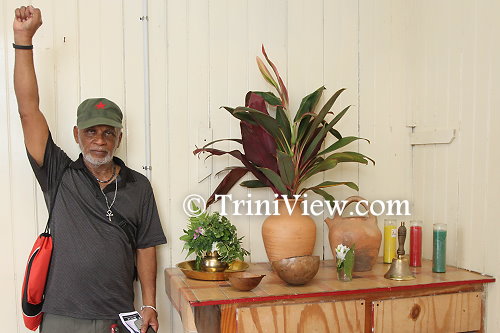
Activist and Trade Unionist, Clive Nunez
Butler was fiery, a great orator. [He] was born on January 21st 1897, and he died on February 20th 1977. At that time, I was a member of the Butler Labour Party (BLP) in the sixties. I was at his side on February 19th 1977, down at Strikers Village in Point Fortin, and even [though] he would have died in less than twenty-four hours, that fire!…That sprit! He always said that he would lead this country politically because he was denied leading this country in the 1950 general elections. He was born in Grenada; his grandfather was born in Barbados. At the age of seventeen, he volunteered to participate in World War One that lasted [from] 1914 to 1918. He was stationed in Egypt, Africa, so he was able to get in touch as a soldier with a lot of soldiers from the different African countries.
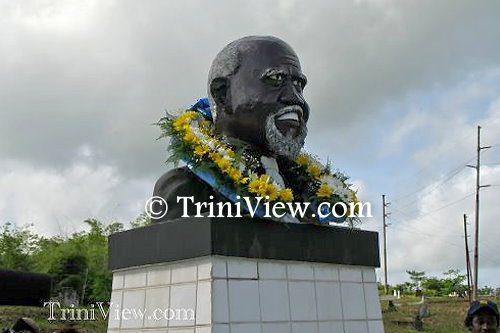
Tubal Uriah ‘Buzz’ Butler’s bust at his grave site in Fyzabad
He formed two organizations after World War One when he returned to Grenada. World War One was about Europeans fighting amongst themselves to capture land and territory. When he came back, he formed the Grenada Union of Returned Soldiers (GURS) and then he also formed another organization called the Grenada Representative Government Movement (GRGM). So there were two organizations that Butler formed in Grenada. The role of the GURS were beginning to struggle for pensions [and] jobs like all soldiers all over the world. They were used and abused, and on their return home, they actually lived in poverty. When he formed the GRGM, one of their main thrusts was beginning a struggle for home rule. That was the forerunner to Independence. So Independence is not about the fifties and the sixties but that Butler had the vision of us ruling ourselves from the colonial masters … twenty-seven years before adult franchise in Trinidad and Tobago and other West Indian countries. Because we got the right to vote in Trinidad with struggle—and Butler was part of that; he was the visionary; he was about the people, not the colonial powers deciding who your leaders must lead in the ex-colonies—in 1946, Trinidad and Tobago and other West Indian countries got the right to vote late in the age of twenty-one. You had to be twenty-one to vote when we got the right to vote [in] 1946. I always laugh when particularly Americans come here for Carnival—both black and white—and they look down at us because they believe that they are the superior human beings in the world. They will look down at you as though you are nothing, and I tell them one thing: “We got the right to vote in 1946. You as black people particularly, got the right to vote only in 1964.” So you see how advanced we were in beginning to rule ourselves?
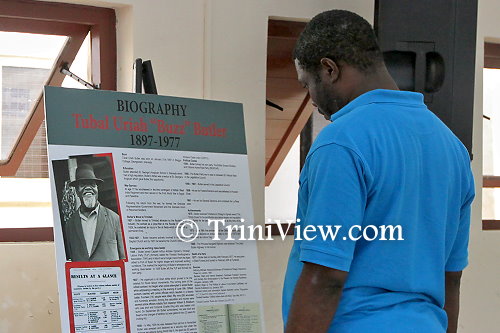
An attendee takes an interest in Butler’s autobiography
Butler came to Trinidad because after World War One, there was a world depression. [Because of] that depression and repression, people had to go to other countries … other islands [because] it was better economically. So Butler came at that time [when] the oilfields [were] being established and, therefore, Trinidad was attractive. When he came here, he got a job as a pipe fitter in the Roodal Oil fields … this is down in Fyzabad. At that time with that depression, the wages for oil workers ranged between five cents an hour and twenty-four cents, and for the sugar workers, it was eight cents and twenty-four cents an hour. That worldwide depression also reduced people’s wages and salaries by thirty percent. [Can you] imagine thirty percent at five cents or ten cents? Do you understand that? Cocoa, which was one of the other mainstays in the economy in Trinidad and Tobago, the price dropped from twenty-two cents to nine cents a pound. You have to be able to understand the dislocation, the kind of poverty that developed with the Europeans fighting among themselves. But they had colonies and as a consequence.
Butler also established the Moravian Baptist church in Fyzabad. You also have to look at Butler developing a mass movement. For those of you who have read or seen the documentary or hear from your grandparents [about] the mass movement back in 1970 in Trinidad, he was developing that, in this time. As a result of the depression and the economic problems, what you had at Apex, which was the name of the company that Butler worked in, they had dismissed two hundred workers. You can imagine what was happening in Fyzabad and in Siparia and all the places. Therefore, the mass movement began.
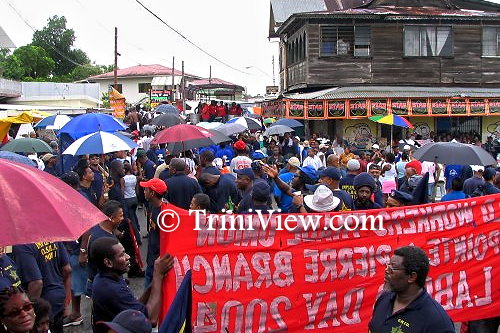
Labour Day in Trinidad and Tobago signifying the beginning of an uprising of laborers in Fyzabad in 1937
During the depression there were five strikes that Butler was involved in, and also hunger marches. Captain A.A. Cipriani had formed an organization called the Trinidad Workingmen’s Association (TWA). You hear that? Trinidad workingmen, not women. Women scarcely got jobs. Butler joined that association and, as a consequence, they had hunger marches. Captain Cipriani eventually formed the Trinidad Labour Party (TLP) and he became the Mayor of Port of Spain. When Butler started that hunger march from Fyzabad to Port of Spain, the governor sent Captain A.A. Cipriani to move him in Chaguanas and to convince him that he must not bring the march into Port of Spain. Cipriani came with the day tidings saying that the two hundred workers will get back their jobs and all kinds of promises. History will record when they turned back the march. After that, they never got back their jobs and that is what caused Butler to leave the TWA and form his own union and then his own political party.
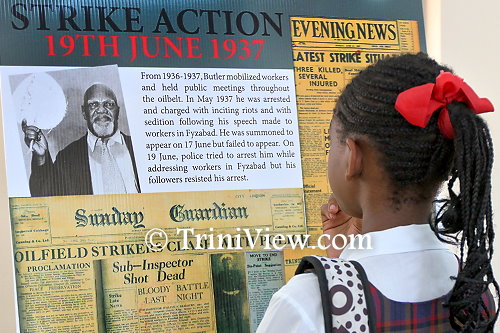
Student reads the exhibited information on the 1930s strikes led by Tubal Uriah ‘Buzz’ Butler
In 1950, Butler’s party won ten seats—more than the other parties—and they denied him being the government of the country. All of that made Butler leave Trinidad and go up to England. But while up there in England, he continued to demand from Britain a rule for Trinidad and Tobago and the rest of the West Indies.
In closing—1937—you see that every year … about the strike that started in Fyzabad. But I want to tell you, that strike was to be a secret strike. The strike was to have started; but do you know what happened? Workers going into work, sure that the pumps not in operation … and that was the signal for the strike. But the electricity went. That triggered that strike; a strike in Trinidad that eventually reached quite up the islands … up to Jamaica. It is now a challenge for the head of the National Parent Teachers Association, parents, teachers and students to begin to agitate and demand that this history, that the history of Marcus Garvey, like the history of Kwame Ture must be on the curriculum. It is the time of leaders that will be developed in this country.
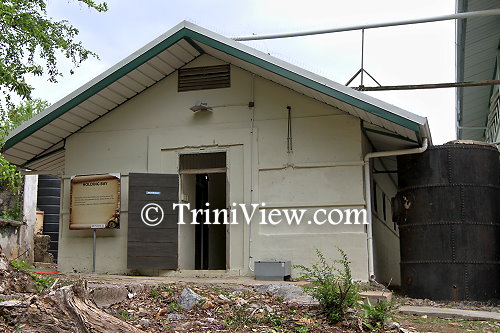
The Holding Bay on Nelson Island. It was used to house the activists who were detained on the island
What I want to tell you, is that Butler had to beg for a pension in this country. There is a quotation that is very important. He said, “As long as there is a single worker whose shack is broken down and is told you have no place in the area, the fight must go on.” And you know what our history says? That Butler was arrested and charged for squatting in Strikers Village in Point Fortin and put in the Royal Jail … a man with that kind of history. But that is what they do. That is why in 1970, they had some of us here. Nine of us they had taken to this island, put in the Royal Jail and charged for sedition. Butler was charged for sedition and quite recently you had Abu Bakr. In the history of this country, eleven persons were charged for sedition. You know what is sedition? Opening the eyes of the people, pointing out to them what are the injustices and why you must fight. I will remain a fighter till my last breath against the injustices in this country.
Also Read:
Tubal Uriah Butler: Nelson Island Experience
Professor Winston Suite on the Nelson Island Experience
Maureen Searles on the Nelson Island Experience
Uriah Butler – Nelson Island Experience in pictures:
www.triniview.com/gallery/main.php?g2_itemId=827189